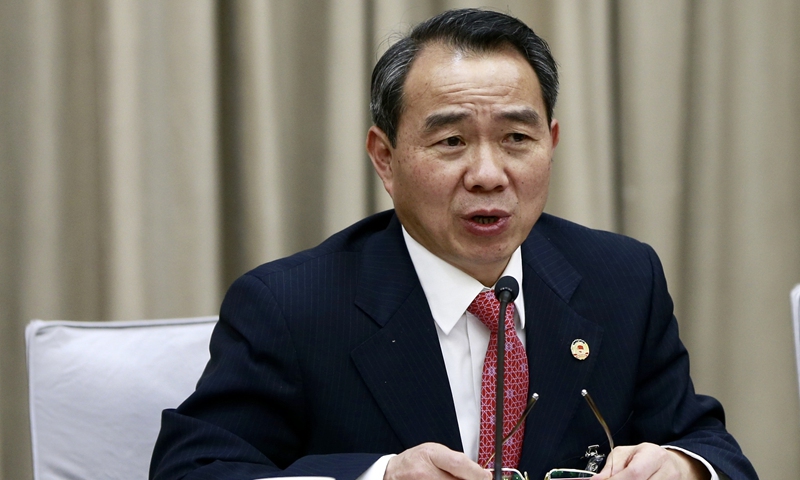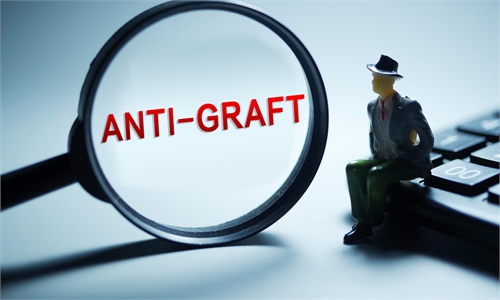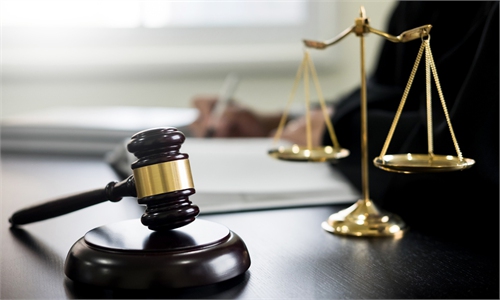Senior Shanghai legislator investigated for violation of disciplines
Fall of first minister-level ‘tiger’ of 2023 showcases graft-busting resolution

Dong Yunhu in 2019. Photo: VCG
The investigation of Dong Yunhu, a senior legislator in Shanghai and first minister-level official to be suspected of severe violations of Party disciplines and laws this year, highlights China's resolution in cracking down on corruption over the long run, experts said, adding that the Party will take a tougher stance and measures in combating corruption to better fulfill the mission of the 20th National Congress of the Communist Party of China (CPC).
Dong, chairman of the Standing Committee of the Shanghai Municipal People's Congress, is being investigated by the CPC Central Commission for Discipline Inspection (CCDI) and the National Commission of Supervision, the CCDI, China's top anti-graft watchdog, announced on its website on Wednesday night.
Dong is the first minister-level official to be investigated this year, according to Beijing Youth Daily. The probe seems to have come suddenly. According to information released by the Shanghai Municipal People's Congress, Dong had a seminar with scholars at the Shanghai Academy of Social Sciences on Monday.
Before beginning work as the chairman of the Standing Committee of the Shanghai Municipal People's Congress in January, Dong, 61, once worked as a deputy director of the State Council Information Office, head of the publicity department of the Xizang Autonomous Region and head of the publicity department of Shanghai.
After the announcement of Dong's investigation, the Standing Committee of the Shanghai Municipal People's Congress convened a meeting on Wednesday night, which stressed firm support for the CPC Central Committee's decision and all-out effort to enforce strict Party disciplines, according to a release from the Shanghai government's public WeChat account.
The meeting also noted that officials should remain highly vigilant in order to purify their social circles and strictly manage family, relatives and subordinates.
The probe into a minister-level official once again showcased the Party's resolution on cracking down on corruption. Efforts to take simultaneous, coordinated and comprehensive steps to ensure that officials do not have the audacity, opportunity or desire to become corrupt have never weakened but only grown stronger, Xu Xing, a professor of politics at the Zhou Enlai School of Government of Nankai University, told the Global Times on Thursday.
Moreover, Dong's case also highlights the significance of strengthening anti-corruption supervision. Party affairs should be made more transparent under inner-Party and non-Party supervision. Power must be exercised in the light of day to ensure that it is exercised correctly, said Xu.
Zhuang Deshui, a deputy director of the Research Center for Government Integrity-Building at Peking University, said that the 20th CPC National Congress report has made it clear that there must be no mercy for corruption and the Party will maintain zero tolerance for corruption, a tough position highlighted by Dong's case.
More than 30 "tigers" have been put under investigation for violations of Party disciplines and laws since the 20th CPC National Congress in October 2022, including Jiang Jie, a vice chairman of the Xizang Regional Committee of the Chinese People's Political Consultative Conference; and Luo Yulin, a former deputy minister-level official of the State-owned Assets Supervision and Administration Commission of the State Council, according to the news outlet Shanghai Observer.
The fall of these officials also reminds people of the grim situation in the fight against corruption after years of persistent efforts as well as the urgency for institution improvement on anti-corruption, said Zhuang.
Given the mission outlined at the 20th CPC National Congress, the Party must combat corruption through self-reform to safeguard national interests and ensure the governing of the country in the face of inter-and-external risks, said the expert.
The second plenary session of the 20th CCDI, which was held in January, stressed in a communiqué the importance of improving the systems and regulations for the Party's self-reform. Those who intentionally defy Party disciplines must be punished severely, the communiqué said, adding that investigations and punishments will be stepped up for recurrent and stubborn problems, old problems that take on new forms and disguised forms of misconduct.
The communiqué also vowed to target those who shirk their responsibilities or fail to make sufficient efforts to implement the major decisions and plans made by the CPC Central Committee.
The focus of this year's anti-corruption work has been directed toward the disciplinary inspection and supervisory organs and central government bodies to build a clean team and prevent degeneracy among officials and strengthen Party building, said Zhuang, pointing to the intensive briefings on investigations into the above organs in early July.
On Monday, the CCDI announced investigations into four officials from disciplinary inspection and supervisory organs, including Lu Zuoquan, head of the Jiangxi Provincial Party Committee inspection team.
While China is further promoting reform, more efforts to combat corruption will be made in the field of finance, State-owned companies and fields related to people's livelihoods, said Zhuang.
As the Party is pushing overall self-reform and perfecting institutional building within the Party, more regulations will be put forward. The Party's stance on fighting against corruption will be tougher, said Zhuang.



